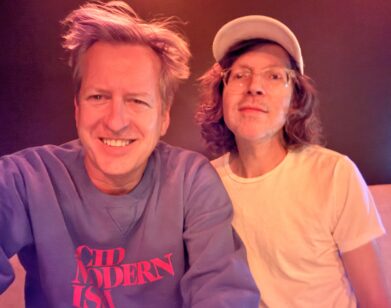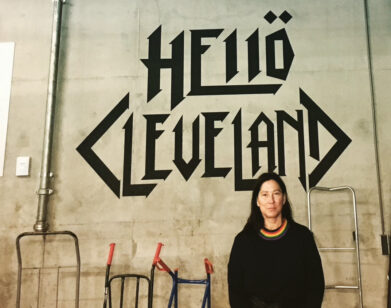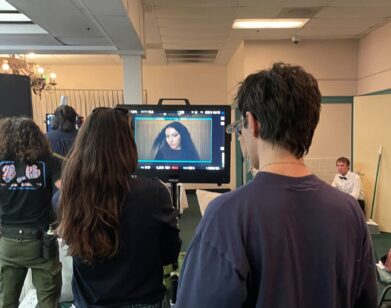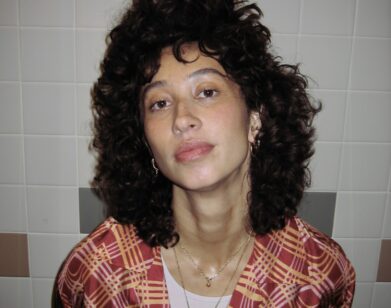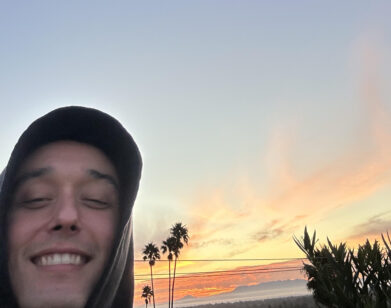Exclusive Song Premiere and Interview: ‘Rotin,’ Janka Nabay and the Bubu Gang
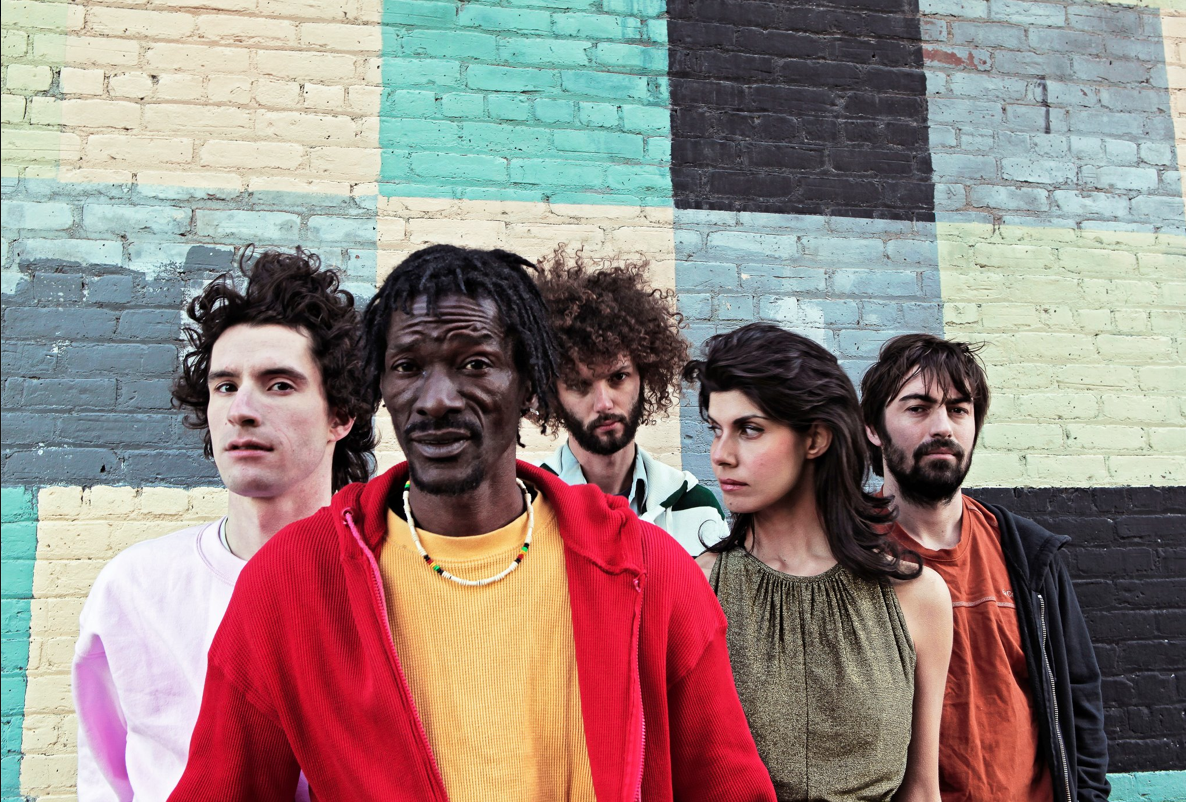
ABOVE: JANKA NABAY (FRONT) AND THE BUBU GANG. IMAGE COURTESY OF CARLY RABALAIS
There really is no one like Ahmed Janka Nabay in the United States. Nabay has created a musical movement (and something of a super-group) with his West African dance music. Nabay and The Bubu Gang (which comprises members of Skeletons, Chairlift, Starring, Saadi, and Highlife) brings together a collection of futuristic, experimental sounds with traditional West African beats: the “bubu music” of Nabay’s native Sierra Leone. Nabay, who has been in the US for 10 years, escaped from the Sierra Leonean Civil War to come here, write songs, and play shows. The sound of bubu music is ultimately deceiving: it seems to span from a futuristic time, when in reality, it’s been around for centuries. There is a legend behind the music that it came from a boy in Sierra Leone who took the music from witches and sacrificed his own life for it. Nabay was able to learn this music as a child after Islam had reached Sierra Leone. Although he’s become an expat, Nabay is proud of his roots—in fact, he created a single, “Nar London,” in honor of Ola Sesay, one of two competitors in the London Olympics from Sierra Leone.
We spoke with Nabay about the advice in his songs, building his band, and being the “bubu king.” We’re also happy to offer the United States premiere of his single “Rotin,” below.

ILANA KAPLAN: So, I hear you’re the “bubu king.” You’ve put out quite an album. Can you tell me about the meaning of your songs and their focus on your culture?
AHMED JANKA NABAY: Let me put this guitar somewhere. Oh, my God. The meaning of the music is “I’m scared.” The first song is called “Feba.” The meaning of “Feba” is “look like,” and the whole reason for putting this album out is because of the treatment that has been received to my people living in America. I want people to know and hear about the way I live here and how people treat me. Some of those songs, some words go for those. There is another song in the album is “Tay-Su-Tan-Tan.” “Don’t follow us” is the meaning of “Tay-Su-Tan-Tan”—”Don’t follow us,” because the thing we do is music. We go different places and meet different people. When we meet different people, they always follow us because our music is good. Girls were trying to run after us. Boys were trying to run after the girls that we are moving with. We had to perform overnight and early in the morning, and we had to leave early in the morning. So, I named that song (“Don’t Follow Us”) “Tay-Su-Tan-Tan,” because we had to go! En Yay Sah (“I’m Scared”) is advice to people who have a lot of children that don’t have the movement to bring those children into group society, because when you’re poor you should not have a lot of children. They don’t listen. If you can make a child grow up nicely by letting him or her go to school and get a nice education, that would be bubu. When you have a lot of children, you can’t do all of those things.
KAPLAN: You’ve really brought a whole new genre over to the U.S. Can you describe bubu music to me?
NABAY: To me, and to everyone that listens, bubu music is excellent. Bubu music is excellent. The world has needed the creation of bubu music. We get people to dance. You feel like dancing when you hear the music. I don’t know how it comes, but I’m so lucky, really. It’s like jumping. I cannot believe that when I performed at the Kennedy Center and everybody was supposed to sit down and watch the show. People were jumping in their chairs. Even people with walkers started dancing. I loved that show. Anyone who saw it would have been like, “Oh, my God.” Bubu music is 500 years old, and nobody took it out of the roots and brought it out to the cities. I’m the first person to do it: record it, travel with it from West Africa, and come to America. Right now, I travel all over America. Not everyone knows about bubu music right now, but I travel throughout all of the States with bubu music. Bubu music is new here.
KAPLAN: How did you meet the members of the Bubu Gang?
NABAY: There is a guy on my recent single that I did for the Olympics in London, Pupa Bajah. I first met him at Babylon in White Metropolitan in Brooklyn. He’s a traveler. Babylon is a bar, restaurant or club, whatever you like to call it. Everybody goes to Babylon. I met him from Bushra (El-Saadi). I went to Babylon and performed karaoke. I put a CD on and did some karaoke. I had my African culture-wear with me. I did that, and after the show, she came to me and said “Janka, I like your show. We should combine. I can sing.” I said, “Well, you don’t know how to speak my language. How can you sing?” She said, “Janka, you can write. I can read. Then we can practice.” The same night, she wrote two or three verses. The next morning, I met her. She lived at Third Street and Fouth Avenue. I was living at Fourth Avenue. I was like, “Let’s see what you’ve got.” Then at Babylon, the drummer, he was a bar man at the same club. Then the girl said, “You should meet the drummer.” Then the drummer brought a bassist, his roommate. These guys played for Skeletons. They brought an organist too.
KAPLAN: How long have you been in the U.S.?
NABAY: This is my 10th year. I came here in 2002. I want you to know something. I live in Washington D.C. Where are you?
KAPLAN: I’m in New York. Cool.
NABAY: I hope we meet in person one day.
KAPLAN: I’ll have to catch your next show!
JANKA NABAY AND THE BUBU GANG’S EN YAY SAH IS OUT NOW. YOU CAN DOWNLOAD “ROTIN” ON SOUNDCLOUD. FOR MORE ON JANKA NABAY AND THE BUBU GANG, PLEASE VISIT THEIR FACEBOOK PAGE.


